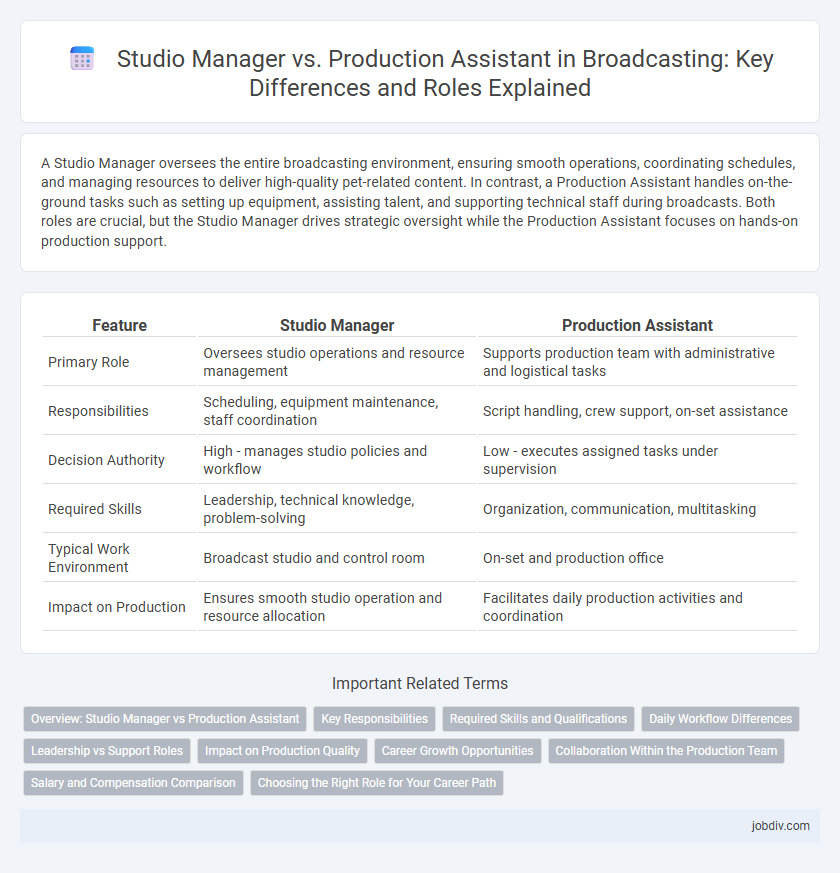A Studio Manager oversees the entire broadcasting environment, ensuring smooth operations, coordinating schedules, and managing resources to deliver high-quality pet-related content. In contrast, a Production Assistant handles on-the-ground tasks such as setting up equipment, assisting talent, and supporting technical staff during broadcasts. Both roles are crucial, but the Studio Manager drives strategic oversight while the Production Assistant focuses on hands-on production support.
Table of Comparison
| Feature | Studio Manager | Production Assistant |
|---|---|---|
| Primary Role | Oversees studio operations and resource management | Supports production team with administrative and logistical tasks |
| Responsibilities | Scheduling, equipment maintenance, staff coordination | Script handling, crew support, on-set assistance |
| Decision Authority | High - manages studio policies and workflow | Low - executes assigned tasks under supervision |
| Required Skills | Leadership, technical knowledge, problem-solving | Organization, communication, multitasking |
| Typical Work Environment | Broadcast studio and control room | On-set and production office |
| Impact on Production | Ensures smooth studio operation and resource allocation | Facilitates daily production activities and coordination |
Overview: Studio Manager vs Production Assistant
A Studio Manager oversees the overall operations of a broadcasting studio, coordinating technical staff, scheduling recordings, and ensuring equipment functionality to maintain smooth production workflows. In contrast, a Production Assistant supports the production team by handling logistical tasks, managing scripts, assisting with set preparation, and facilitating communication between departments. While the Studio Manager has a leadership role focused on strategic planning and resource management, the Production Assistant ensures day-to-day operational efficiency during broadcasts and recordings.
Key Responsibilities
A Studio Manager oversees the entire broadcast environment, managing scheduling, technical operations, and coordination between teams to ensure smooth production workflows. A Production Assistant supports the production team by handling logistical tasks such as equipment setup, script distribution, and on-set coordination to facilitate efficient shoot execution. The Studio Manager focuses on strategic management and broadcast quality control, while the Production Assistant emphasizes operational support and task execution during production.
Required Skills and Qualifications
Studio Managers need strong organizational skills, technical proficiency in broadcasting equipment, and experience managing live productions to ensure seamless studio operations. Production Assistants require basic technical knowledge, multitasking abilities, and strong communication skills to support producers and crew during shoots. Both roles benefit from adaptability and familiarity with industry-standard software, but Studio Managers typically hold formal qualifications in media production or broadcasting management.
Daily Workflow Differences
Studio Managers oversee the overall coordination of broadcasting operations, managing schedules, technical equipment, and personnel to ensure seamless production flow. Production Assistants handle the execution of daily tasks such as setting up equipment, managing scripts, and assisting talent, supporting the technical and creative needs during live or recorded sessions. The Studio Manager's workflow emphasizes strategic planning and troubleshooting, while the Production Assistant focuses on operational support and real-time problem-solving.
Leadership vs Support Roles
Studio Managers oversee broadcasting operations, ensuring smooth coordination, decision-making, and team leadership to maintain high production standards. Production Assistants provide essential support by handling logistical tasks, managing equipment, and assisting crew members to facilitate seamless workflow. The leadership role of Studio Managers contrasts with the supportive function of Production Assistants, highlighting different responsibilities within broadcast production teams.
Impact on Production Quality
Studio Managers oversee the entire broadcast environment, ensuring seamless coordination between technical crews and talent, which directly enhances production quality by minimizing errors and delays. Production Assistants support the team with logistical tasks and equipment setup, contributing indirectly to the smooth flow of production but with less influence on overall quality control. The Studio Manager's strategic oversight and decision-making play a critical role in maintaining high broadcast standards and timely content delivery.
Career Growth Opportunities
Studio Managers typically have greater career growth opportunities, advancing to senior management roles due to their oversight of technical operations and team coordination. Production Assistants often start with entry-level tasks, gaining experience that can lead to specialized production roles or eventually studio management positions. Both roles offer pathways in broadcasting, but Studio Managers generally experience faster progression in leadership and strategic responsibilities.
Collaboration Within the Production Team
A Studio Manager oversees the overall coordination of broadcasting operations, ensuring seamless communication between technical staff, on-air talent, and production teams. Production Assistants support the workflow by managing specific tasks such as equipment setup, script organization, and timing cues, contributing to efficient collaboration. Effective teamwork between the Studio Manager and Production Assistants enhances live broadcast quality and adherence to production schedules.
Salary and Compensation Comparison
Studio Managers in broadcasting typically earn between $60,000 and $90,000 annually, reflecting their responsibility for overseeing studio operations and technical staff. Production Assistants usually have a lower salary range, from $30,000 to $45,000, due to their entry-level role supporting production logistics and coordinating tasks. Compensation packages for Studio Managers often include bonuses and benefits such as health insurance and retirement plans, while Production Assistants may receive limited benefits and fewer performance incentives.
Choosing the Right Role for Your Career Path
Choosing between a Studio Manager and a Production Assistant depends on career goals in broadcasting; Studio Managers oversee operations, equipment, and schedules, making strategic decisions for smooth studio function, ideal for those seeking leadership roles. Production Assistants support the production team with administrative tasks, coordination, and on-set assistance, suited for individuals starting in the industry or aiming to gain broad experience. Evaluating skills, desired responsibilities, and long-term objectives helps determine the right path for career growth in the broadcasting field.
Studio Manager vs Production Assistant Infographic

 jobdiv.com
jobdiv.com